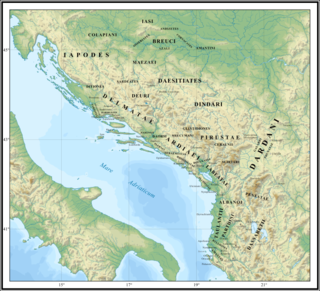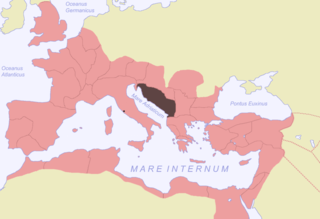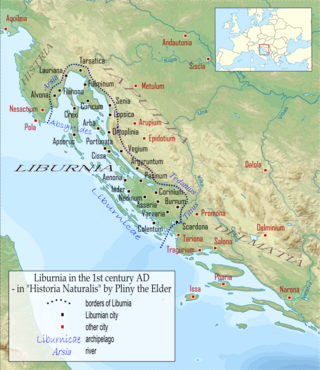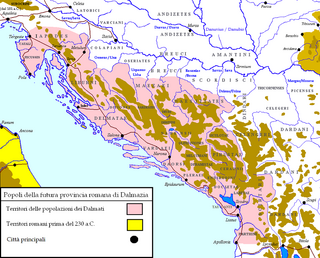Illyrian may refer to:

In classical antiquity, Illyria was a region in the western part of the Balkan Peninsula inhabited by numerous tribes of people collectively known as the Illyrians.
Illyricum may refer to:

The Illyrians were a group of Indo-European-speaking people who inhabited the western Balkan Peninsula in ancient times. They constituted one of the three main Paleo-Balkan populations, along with the Thracians and Greeks.

The area known as Croatia today has been inhabited throughout the prehistoric period, ever since the Stone Age, up to the Migrations Period and the arrival of the White Croats.
Illyria is a historical region in Southeastern Europe, inhabited in antiquity by the Illyrians.
Taulantii or Taulantians were an Illyrian people that lived on the Adriatic coast of southern Illyria. They dominated at various times much of the plain between the rivers Drin (Drilon) and Vjosa (Aoös). Their central area was the hinterland of Epidamnos-Dyrrhachion, corresponding to present-day Tirana and the region between the valleys of Mat and Shkumbin (Genusus). The Taulantii are among the oldest attested Illyrian peoples, who established a powerful kingdom in southern Illyria. They are among the peoples who most marked Illyrian history, and thus found their place in the numerous works of historians in classical antiquity.
The Delmatae, alternatively Dalmatae, during the Roman period, were a group of Illyrian tribes in Dalmatia, contemporary southern Croatia and western Bosnia and Herzegovina. The region of Dalmatia takes its name from the tribe.

Illyricum was a Roman province that existed from 27 BC to sometime during the reign of Vespasian. The province comprised Illyria/Dalmatia in the south and Pannonia in the north. Illyria included the area along the east coast of the Adriatic Sea and its inland mountains, eventually being named Dalmatia. Pannonia included the northern plains that now are a part of Serbia, Croatia and Hungary. The area roughly corresponded to part or all of the territories of today's Albania, Kosovo, Montenegro, Serbia, Bosnia and Herzegovina, Croatia, and Slovenia.

The Illyrian movement was a pan-South-Slavic cultural and political campaign with roots in the early modern period, and revived by a group of young Croatian intellectuals during the first half of the 19th century, around the years of 1835–1863. This movement aimed to create a Croatian national establishment in Austria-Hungary through linguistic and ethnic unity, and through it lay the foundation for cultural and linguistic unification of all South Slavs under the revived umbrella term Illyrian.

Within the boundaries of today's Bosnia and Herzegovina, there have been many layers of prehistoric cultures whose creation and disappearance are linked to migrations of unidentified ethnic groups.

Illyrius is the son of Cadmus and Harmonia, who eventually ruled Illyria and became the eponymous ancestor of the Illyrians. Illyrius/Illyriós/Illyri is a name known in different stories found in ancient Greek mythology.

Praevalitana was a Late Roman province that existed between c. 284 and c. 600. It included parts of present-day Montenegro, Albania, and part of present-day Kosovo. Its capital city was Doclea, later Scodra.
The Parthini, Partini or Partheni were an Illyrian tribe that lived in the inlands of southern Illyria. They likely were located in the Shkumbin valley controlling the important route between the Adriatic Sea and Macedonia, which corresponded to the Via Egnatia of Roman times. Consequently, their neighbours to the west were the Taulantii and to the east the Dassaretii in the region of Lychnidus.

Delminium was an Illyrian city and the capital of Dalmatia which was located somewhere near today's Tomislavgrad, Bosnia and Herzegovina, under which name it also was the seat of a Latin bishopric.

The Illyrian language was an Indo-European language or group of languages spoken by the Illyrians in Southeast Europe during antiquity. The language is unattested with the exception of personal names and placenames. Just enough information can be drawn from these to allow the conclusion that it belonged to the Indo-European language family.
Epidaurus or Epidauros was an ancient Greek colony founded sometime in the 6th century BC and renamed to Epidaurum during Roman rule in 228 BC, when it was part of the province of Illyricum and later of Dalmatia. It is located at present-day Cavtat in Croatia, 15 km (9 mi) south of Dubrovnik.

Mazaei or Maezaei were a sub-tribe of the Illyrians, autochthonous to the interior of today's Bosnia and Herzegovina, settled mainly in the Sana river basin, the middle course of Vrbas, and around the Vrbanja and Ugar rivers.
Illyrians may refer to:
Illyrology or Illyrian studies is interdisciplinary academic field which focuses on scientific study of Illyria and Illyrians as a regional and thematic branch of the larger disciplines of ancient history and archaeology. A practitioner of the discipline is called Illyrologist. His duty is to investigate the range of ancient Illyrian history, culture, art, language, heraldry, numizmatic, mythology, economics, ethics, etc. from c. 1000 BC up to the end of Roman rule around the 5th century.